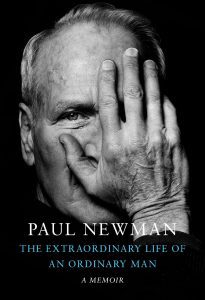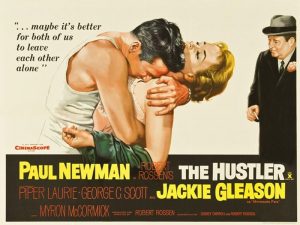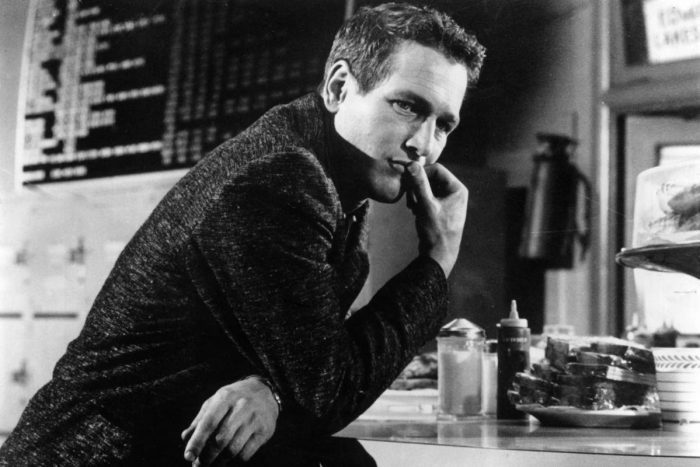Book Review: The Extraordinary Life of an Ordinary Man – A memoir by Paul Newman
Based on interviews and oral histories conducted by Stewart Stern; Compiled and edited by David Rosenthal
Reviewed by Jeffrey Sanzel
“I’ve always had a sense of being an observer of my own life.” — Paul Newman
Paul Newman starred in over seventy films, including Cat on a Hit Tin Roof, Cool Hand Luke, Butch Cassidy and the Sundance Kid, The Verdict, The Sting, The Hustler, Absence of Malice, and many more. From 1986 to 1991, the iconic Newman sat down with writer Stewart Stern (best known for the screenplay of Rebel Without a Cause) for a series of intense interviews. In addition, Stern spoke with friends, relatives, and colleagues for their perspectives. Newman’s driving force in the project was public revelation: “I want to leave some kind of record that sets things straight, pokes holes in the mythology that’s sprung up around me, destroys some of the legends, and keeps the piranhas off.”
For whatever reason, the book was left unfinished. Newman passed away in 2008, and Stern in 2015. They left behind an archive of fourteen thousand pages.
 David Rosenthal has compiled and edited the chronicle into The Extraordinary Life of an Ordinary Man (Knopf Doubleday). Presented as Newman’s memoir, Rosenthal intersperses Newman’s very personal perspective with the additional interviews. The intense, riveting work reflects a man of fascinating contradictions whose legacy lives on in cinematic history and far-reaching philanthropy. Newman’s daughter, Melissa, describes the book as “… a sort of self-dissection, a picking a part of feelings, motives, and motivations, augmented by a Greek chorus of other voices and opinions, relatives, navy buddies, and fellow artists. One overriding theme is the chronic insecurity which will be familiar to so many artists. Objectivity is fickle.”
David Rosenthal has compiled and edited the chronicle into The Extraordinary Life of an Ordinary Man (Knopf Doubleday). Presented as Newman’s memoir, Rosenthal intersperses Newman’s very personal perspective with the additional interviews. The intense, riveting work reflects a man of fascinating contradictions whose legacy lives on in cinematic history and far-reaching philanthropy. Newman’s daughter, Melissa, describes the book as “… a sort of self-dissection, a picking a part of feelings, motives, and motivations, augmented by a Greek chorus of other voices and opinions, relatives, navy buddies, and fellow artists. One overriding theme is the chronic insecurity which will be familiar to so many artists. Objectivity is fickle.”
The book is predominantly chronological, beginning with his difficult childhood. “My brother [Arthur] chose to remember the good things from our childhood, while I best recall the failures and the things that didn’t go right.” Newman grew up in Shaker Heights, Ohio, in an almost pathologically dysfunctional middle-class family, with an alcoholic father and a narcissistic mother. (Later in life, he cut ties with the destructive matriarch.)
Insecurities, including a sense of intellectual inferiority, plagued him from a young age. “I wasn’t naturally anything. I wasn’t a lover. I wasn’t an athlete. I wasn’t a student. I wasn’t a leader. I measured things by what I wasn’t, not by anything I was. I felt that there was something lacking in me that I couldn’t bridge, didn’t know much about and couldn’t fathom.”
The book follows Newman in college years before and after World War II. There are tales of his early years onstage, a great deal of drinking (including being thrown off the football squad because of a town brawl), and more than fleeting references to his personal life. Of the theatre work, “I never enjoyed the acting, never enjoyed going out there and doing it. I enjoyed all the preliminary work — the detail, the observation, putting things together.”
He met his first wife, Jackie Witte, in a Wisconsin summer stock, and they married in 1949. (Witte speaks frankly but without rancor about her marriage to Newman.) He admits they were relatively clueless: “We were two very young people trying to act grown-up.” They had three children: Scott, Susan, and Stephanie, before divorcing in 1958. Newman highlights his struggle in coming to terms with what it meant to be a father, particularly to Scott, who would die at age twenty-eight from complications due to drug and alcohol use.
After a short and unfulfilling stint at Yale Drama School, and with very few credits, he landed a small role and understudy job in the Broadway production of William Inge’s Picnic (1953-54). Eventually, Newman stepped into the main supporting role. During the run, he met Joanne Woodward. When Newman asked director Josh Logan if he could move into the lead, Logan responded, “I’d like to, kid, but you don’t have any sex threat.” However, this would change over the next several years. “Joanne gave birth to a sexual creature. She taught him, she encouraged him, she delighted in the experimental. I was in pursuit of lust. I’m simply a creature of her invention.”
The volatile, off-again, on-again affair with Woodward eventually dissolved his marriage. Newman and Woodward married in 1958, a union that lasted the rest of his life. The book covers the highs and lows of the famous couple, giving a less hagiographic view of the relationship that endured many personal and professional highs and lows. They would have three children: Elinor, Melissa, and Claire.
Newman details his film career, beginning with The Silver Chalice, and carrying on through some of the most famous movies in motion picture history, working with some of the highest-profile directors, actors (including his good friend Robert Redford), writers, and producers. He generously praises his many collaborators and often denigrates his own talents. Luminaries such as John Huston and George Roy Hill have nothing but admiration for his talent and professionalism.
Throughout, he touches on his politics (including work with the Civil Rights movement), his passion for auto racing (which began with the 1969 film Winning), and his many charitable endeavors. An entire chapter addresses his drinking, which he confesses could be heavy and destructive. In time, he gave up hard liquor, but there is a sense of inconclusiveness in his alcohol-related revelations.
Over the years, Newman became less responsive to the outside world, reducing his communication to the fewest words possible. However, he is forthcoming about his frustrations with the press and fans and his reluctance to sign autographs and pose for pictures.
The final chapter is both revelatory and ambivalent, reflecting a complicated man struggling to find a center. “But I am convinced that this is only a dress rehearsal.” Newman continued to evolve and grow over the remaining years of his life, finding joy in work and family. This book — “part confessional, part self-analysis” — gives an incredible glimpse into the mind and heart of an enigmatic and fascinating individual. Pick up a copy at your favorite bookstore, amazon.com or barnesandnoble.com.
———————————————————————————————————————-
 As a tribute to Paul Newman, the Cinema Arts Centre, 423 Park Ave., Huntington will host a special event celebrating the publication of The Extraordinary Life of an Ordinary Man on Monday, Nov. 28 at 7 p.m. The evening will feature a screening of Newman’s most enduring film, the 1961 sports drama The Hustler followed by a discussion with Paul Newman’s daughter, Melissa Newman. Tickets are $43 for film and discussion; $25 for the film only. To order, visit www.cinemaartscentre.org.
As a tribute to Paul Newman, the Cinema Arts Centre, 423 Park Ave., Huntington will host a special event celebrating the publication of The Extraordinary Life of an Ordinary Man on Monday, Nov. 28 at 7 p.m. The evening will feature a screening of Newman’s most enduring film, the 1961 sports drama The Hustler followed by a discussion with Paul Newman’s daughter, Melissa Newman. Tickets are $43 for film and discussion; $25 for the film only. To order, visit www.cinemaartscentre.org.







